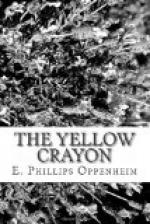She unfastened the clasp and seated herself in his most comfortable chair. The firelight flashed and glittered on the silver ornaments of her dress; her neck and arms, with their burden of jewels, gleamed like porcelain in the semi-darkness outside the halo of his student lamp. And he saw that her dark hair hung low behind in graceful folds as he had once admired it. He stood a little apart, and she noted his traveling clothes and the various signs of a journey about the room.
“You may be glad to see me,” she remarked, looking at him with a smile. “You don’t look it.”
“I am anxious to hear your news,” he answered. “I am convinced that you have something important to say to me.”
“Supposing,” she answered, still looking at him steadily, “supposing I were to say that I had no object in coming here at all—that it was merely a whim? What should you say then?”
“I should take the liberty,” he answered quietly, “of doubting the evidence of my senses.”
There was a moment’s silence. She felt his aloofness. It awoke in her some of the enthusiasm with which this mission itself had failed to inspire her. This man was measuring his strength against hers.
“It was not altogether a whim,” she said, her eyes falling from his, “and yet—now I am here—it does not seem easy to say what was in my mind.”
He glanced towards the clock.
“I fear,” he said, “that it may sound ungallant, but in case this somewhat mysterious mission of yours is of any importance I had better perhaps tell you that in twenty minutes I must leave to catch the Scotch mail.”
She rose at once to her feet, and swept her cloak haughtily around her.
“I have made a mistake,” she said. “Be so good as to pardon my intrusion. I shall not trouble you again.”
She was half-way across the room. She was at the door, her hand was upon the handle. He was white to the lips, his whole frame was shaking with the effort of intense repression. He kept silence, till only a flutter of her cloak was to be seen in the doorway. And then the cry which he had tried so hard to stifle broke from his lips.
“Lucille! Lucille!”
She hesitated, and came back—looking at him, so he thought, with trembling lips and eyes soft with unshed tears.
“I was a brute,” he murmured. “I ought to be grateful for this chance of seeing you once more, of saying good-bye to you.”
“Good-bye!” she repeated.
“Yes,” he said gravely. “It must be good-bye. I have a great work before me, and it will cut me off completely from all association with your world and your friends. Something wider and deeper than an ocean will divide us. Something so wide that our hands will never reach across.”
“You can talk about it very calmly,” she said, without looking at him.
“I have been disciplining myself,” he answered.




